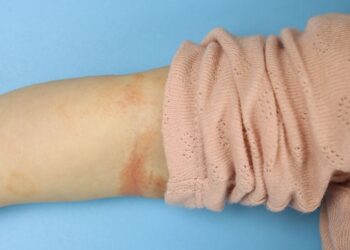TOPLINE:
In patients with chronic vulvar complaints, allergic contact dermatitis (ACD) shows high prevalence with 86.6% exhibiting positive patch test reactions, of which 37.9% were clinically relevant. Nearly half of patients (43.3%) had reactions to spices and herbs, with 34.5% having clinically relevant reactions.
METHODOLOGY:
- Researchers conducted a retrospective analysis of 67 adult patients with chronic unexplained vulvar complaints who underwent patch testing at Amsterdam University Medical Centre, Amsterdam, the Netherlands, between January 2015 and January 2024.
- Participants underwent testing with the European Baseline Series and a spices and herbs series containing 34 different allergens tested at 10% concentration in petrolatum.
- Analysis included patch test readings conducted according to European Society of Contact Dermatitis guidelines on days 2, 3/4, and when possible, days 6/7.
TAKEAWAY:
- Metal allergens were most frequently identified (50.8%; 95% CI, 38.8%-62.7%), though only one case (2.9%; 95% CI, 0.0%-4.4%) was deemed clinically relevant to vulvar complaints.
- Spices and herbs were the second most common allergens (43.3%; 95% CI, 31.4%-55.1%), with bell pepper emerging as the most frequent sensitizer.
- Fragrances elicited positive reactions in 37.3% of patients (95% CI, 25.7%-48.9%), with 60% (95% CI, 40.8%-79.2%) of these reactions being clinically relevant.
- According to the researchers, a significant association was found between positive reactions to herbs and spices and positive reactions to Fragrance Mix 1 in the European Baseline Series (P = .002).
IN PRACTICE:
“Both topically applied cosmetic and medicinal products, as well as systemically ingested substances, such as spices and herbs, may contribute to ACD affecting the vulvar region. To enhance diagnostic accuracy, patch test series should be tailored to the patient’s clinical history and specific allergen exposures,” the authors of the study wrote.
SOURCE:
This study was led by Tirza Blom, Department of Dermatology, Amsterdam University Medical Center in Amsterdam, the Netherlands. It was published online in Contact Dermatitis.
LIMITATIONS:
According to the authors, this study’s retrospective design and potential referral bias from being conducted at a tertiary hospital may limit generalizability of results. Selection bias was noted as patients with higher suspicion of contact allergy were more likely to undergo patch testing. Additionally, clinical relevance was not assessed for 6.9% of positive patch test reactions, and the lack of routine patch test readings at days 6/7 may have resulted in missed positive reactions.
DISCLOSURES:
The authors declared no conflicts of interest.
This article was created using several editorial tools, including AI, as part of the process. Human editors reviewed this content before publication.
Source link : https://www.medscape.com/viewarticle/test-spice-allergies-solve-persistent-vulvar-dermatitis-2025a1000e3b?src=rss
Author :
Publish date : 2025-05-29 10:18:00
Copyright for syndicated content belongs to the linked Source.














